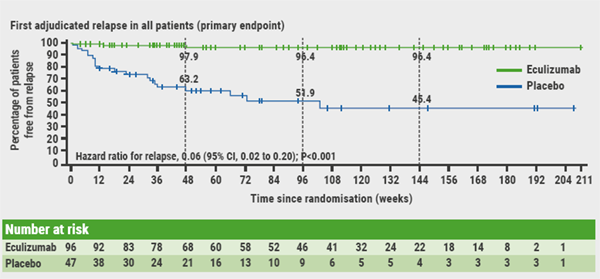Prof. James Howard (University of North Carolina School of Medicine, USA) presented the results of a phase 2 trial of zilucoplan [1]. He explained zilucoplan is a subcutaneously self-administered small molecule complement inhibitor, targeting complement 5a (C5a) to C6. By inhibiting C5 activation, zilucoplan prevents formation and assembly of the membrane attack complex in myasthenia gravis. The 44 patients included in the trial had Quantitative Myasthenia Gravis (QMG) scores ≥12. They were randomised 1:1:1 to placebo, zilucoplan 0.1 mg/kg/day, or 0.3 mg/kg/day for 12 weeks. The 0.3 mg/kg group experienced a mean reduction of 6 points in QMG score (placebo corrected change -2.8; P=0.05) in addition to a reduction of 3.4 points in MG-ADL score (placebo-corrected change -2.3; P=0.04).
Zilucoplan had a favourable safety and tolerability profile, consistent with prior clinical trials. Prof. Howard went on to present results from the long-term open-label extension (OLE), in which 43 patients entered. The 14 patients in the placebo group switched to zilucoplan 0.3 mg/kg. The change from baseline in QMG score after 24 weeks was significant in both the original treatment arm (P<0.0001) and the original placebo arm (P=0.01). This was also true for the change in MG-ADL scores (P<0.0001 and P=0.0004, respectively). Based on these results, zilucoplan will be further evaluated in a registrational phase 3 trial.
Additionally, results of a prospective, randomised, double-blind, single-centre study suggest that preoperative intravenous immunoglobulin (IVIg) to prevent myasthenic crisis in myasthenia gravis patients is unjustified under certain conditions [2]. The results of this prospective study were presented by Dr Josep Gamez (Vall d’Hebron University Hospital, Spain). The 47 participants were scheduled for surgery under general anaesthesia, and were randomised 1:1 to treatment with IVIg at 0.4 mg/kg/day for 5 days, or saline solution under the same conditions. Primary outcome was the occurrence of myasthenic crisis. Only 1 patient, who received placebo, presented with myasthenic crisis requiring non-invasive ventilation (but not reintubation) for 6 days. There were no differences between groups in the univariate analysis, nor risk factors for myasthenic crisis in the multivariate analysis. Dr Gamez observed: “In our series no myasthenic crisis may be expected if preoperative QMG score <8 and preoperative FVC >70%”. He concluded: “IVIg need not be administered to patients before thymectomy and other surgical procedures if there is a good preoperative functional status; and in multidisciplinary units with neurologists, anaesthetists, and surgeons experienced in myasthenia gravis patient care.”
1. Howard JF, et al. AAN 2019, emerging science 008.
2. Gamez J, et al. AAN 2019, Plen02.003.
Posted on
Previous Article
« Amyloid PET in cognitively impaired patients Next Article
Cannabidiol effective in children with Dravet syndrome »
« Amyloid PET in cognitively impaired patients Next Article
Cannabidiol effective in children with Dravet syndrome »
Table of Contents: AAN 2019
Featured articles
Letter from the Editor
Interview with Prof. Natalia Rost
Alzheimer's Disease and other Dementias
Amyloid PET in cognitively impaired patients
Tight blood pressure control lowers risk of mild cognitive impairment
Epilepsy
Headache and Migraine
Multiple Sclerosis and NMOSD
Immune tolerance by peptide-loaded tolerogenic dendritic cells
Biotin, ocrelizumab, and ibudilast in progressive MS
No increased MS relapse risk postpartum
Neuromuscular Disorders
First-ever effective and safe treatment of CMT1A
Parkinson’s Disease and other Movement Disorders
Leukaemia and hypertension therapies tested in Parkinson’s disease
Stroke
Miscellaneous
Possibly lifesaving therapy in refractory PML
New AAN guideline for treating Tourette syndrome
Subspecialty teleneurology: feasible and highly valued
Related Articles
July 30, 2019
Lasmiditan: rapid onset of efficacy in acute migraine

July 30, 2019
Three very promising new treatments of NMOSD
July 30, 2019
Galcanezumab reduces cluster headache frequency
© 2024 Medicom Medical Publishers. All rights reserved. Terms and Conditions | Privacy Policy
HEAD OFFICE
Laarderhoogtweg 25
1101 EB Amsterdam
The Netherlands
T: +31 85 4012 560
E: publishers@medicom-publishers.com

